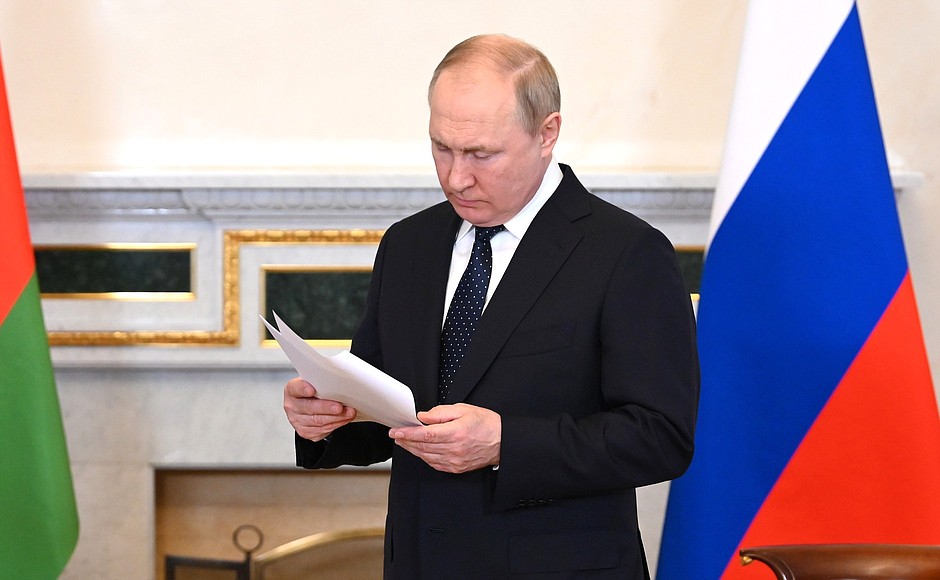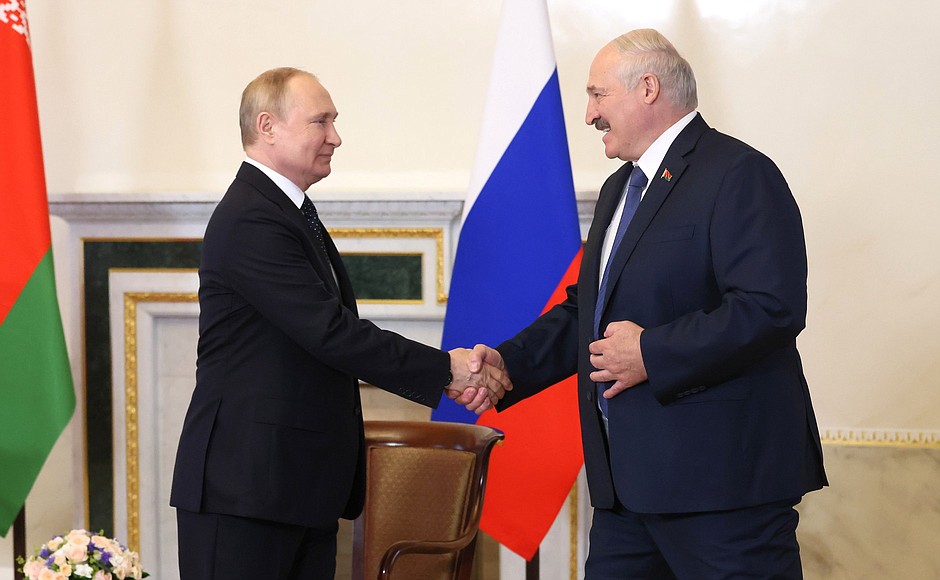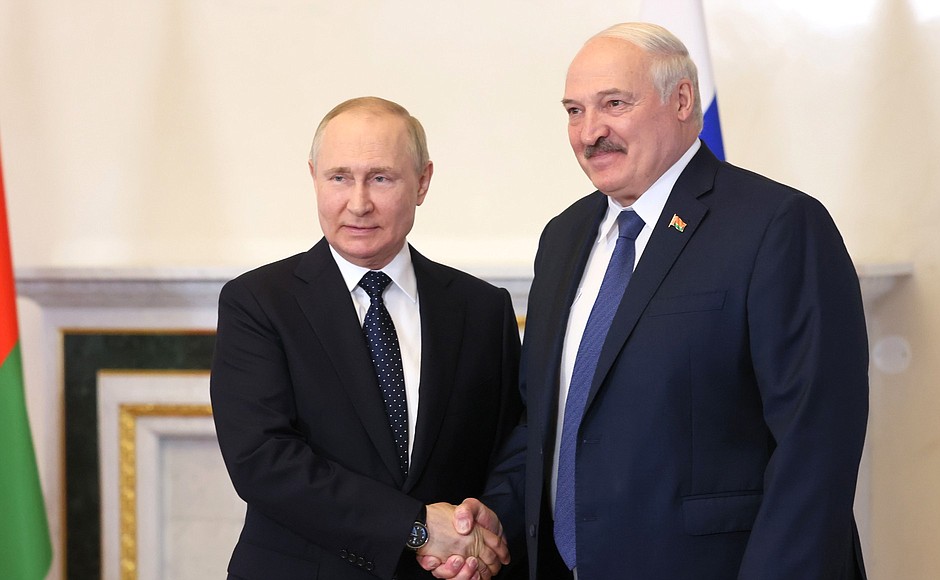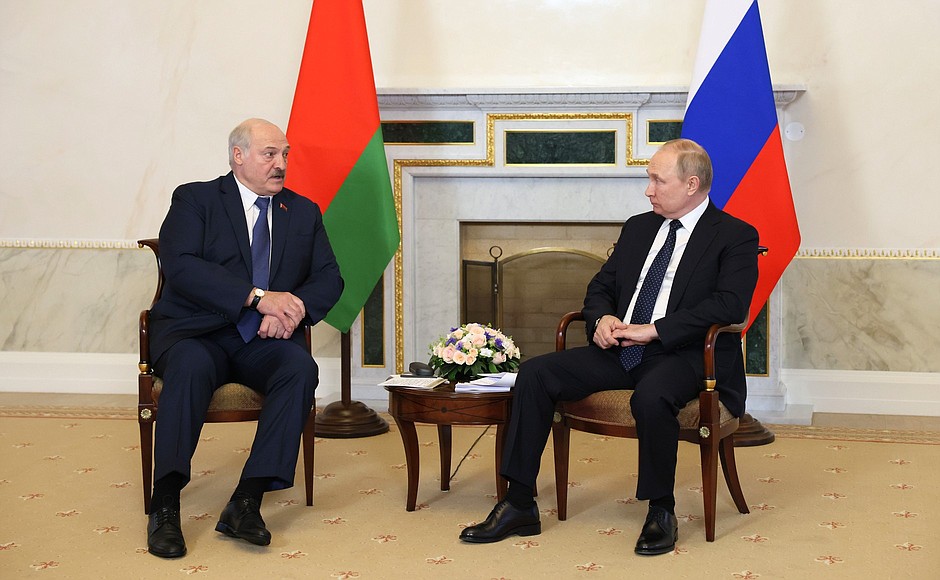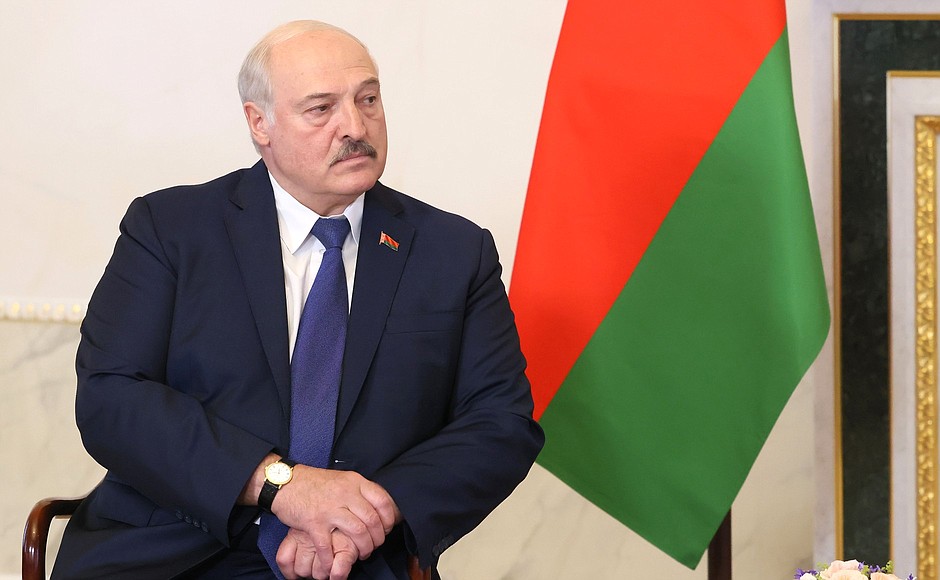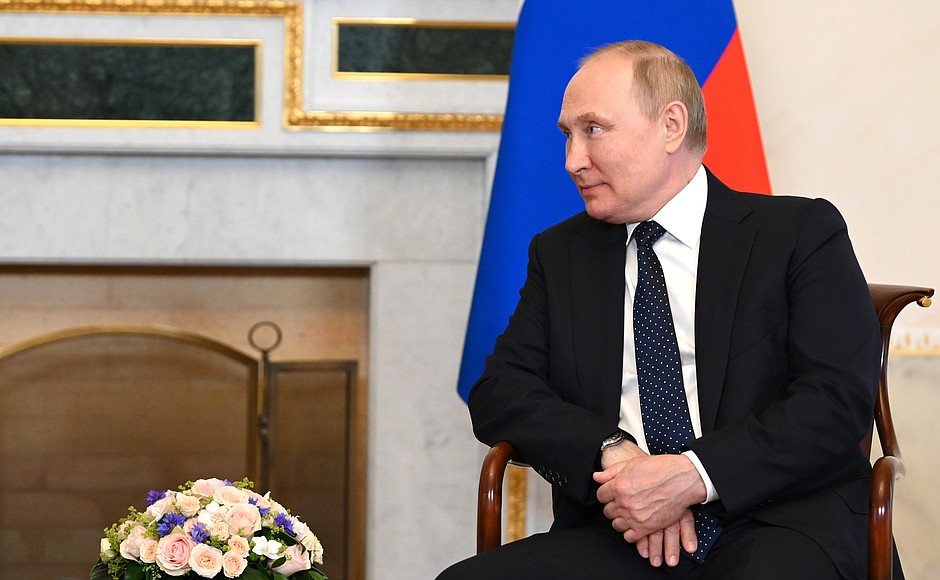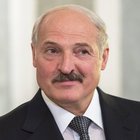Beginning of Russian-Belarusian talks
President of Russia Vladimir Putin: Good afternoon, Mr Lukashenko.
Thank you for coming.
We are having our meeting on a remarkable day: on the 30th anniversary of the establishment of diplomatic relations between our countries. It is not an ordinary day, and that is why we agreed to meet. In addition, the scale of our interaction is so big that we need constant coordination, and that is what we are doing.
I would like to note again that last year bilateral trade grew by over one third and exceeded US$38 billion, and the increase continued throughout the first four months of this year.
President of Belarus Alexander Lukashenko: 110 percent.
Vladimir Putin: That’s it, so it appears we are on the right track.
Russia has invested US$4 billion in the Belarusian economy in the previous years, which are our direct investments. Belarusian businesses also made investments. We have good large-scale joint projects, and there are many current issues in this area.
I would like to tell you about the course and the outcome of the discussions with our BRICS colleagues. Many of the speakers expressed concerns related to disruptions in food deliveries and price hikes on food and fertiliser in the global markets.
Considering that Russia and Belarus are the biggest suppliers of fertiliser to the global market, I would like to discuss with you ways of satisfying the demand on the global market and our permanent customers.
I think we have 15 percent of the global trade, and 25 percent in some fertilisers, which is a very significant amount in the world markets. Low use of fertiliser obviously brings down the next year’s harvest outlook. All that is very regrettable.
Nevertheless, we have agreed to undertake everything we can and take all steps dependent on us so as – I will repeat it – to satisfy the needs of our consumers, our customers.
Evidently, there are problems with maintaining security in the region and in the entire world. A number of questions arise here. I will inform you about all these problems with regard to the developments in Donbass.
Issues related to building the Union State certainly remain within our scope of efforts. Our respective agencies have agreed on practically everything, and now the issue is just the implementation of all the set goals.
Overall, we have a fairly big and substantive list of issues to be discussed today.
Alexander Lukashenko: Mr Putin, I am always grateful to you for helping me discover some points as a historian, as you are aware. You gave me a chance to go to that wonderful place: I visited Bronka, where we are planning to build a Belarusian seaport. Thank you for your support and for your endorsement of that construction project.
I had a look at it, and I was very glad to see what Kronstadt is, to see for myself the dam that was built with your enormous assistance, during your term in office. It was also great to see other places, to see the view of St Petersburg from the water. It was very important and useful for me in view of the port facilities construction.
We are satisfied with the designated site you endorsed; it is a good place. Therefore, we are beginning to load mineral fertiliser there. I think it will be a high-capacity port. It may not even be enough for us, but as we agreed, we will see if we need to expand it.
I planned to discuss economic issues with you, and you have already mentioned them. I would ask you to have an in-depth talk on defence issues, it is crucial for us, in view of the developments in the West, as well as security issues.
Speaking about the economy, out traditional topic is import substitution. We have proposed 15 big projects. The Russian side has approved them and you have supported us with the funding of the projects. If things run as planned, we will launch import-substitution production shortly. That is, we will be able, within this year and in the following year, to manufacture our products instead of those that companies from unfriendly countries used to supply us with. There are 15 such big projects.
Logistics. I have already said about the port of Bronka. I have viewed it today.
I would like to talk to you about the Shanghai Cooperation Organisation, where we have observer status. I will ask for your advice, and you will probably support us in upgrading our status. We have had it for a long time. I do not think we will be unwanted there.
We will also discuss the Forum of the Regions.
Vladimir Putin: To be held on July 1.
Alexander Lukashenko: Yes, I think we will traditionally take part via videoconference. This forum is held by parliament members, the upper chambers of the parliaments. They are good at organising it both in our country and in Russia, so I am sure they will hold a very good forum in Grodno.
I have a number of specific issues I want to discuss with you concerning of the economy as well as defence.
We are very concerned about the situation and the policy pursued by our neighbours. You are aware that this is mostly the leaders of Poland and Lithuania. A confrontation policy. You also get enough from them, especially in Ukraine: we noted that the greatest number of mercenaries have recently been those from Poland. I do not understand why they want it, the confrontation, but clearly they are pushed by those standing behind them and the like. Nevertheless, the policy is appalling and their behaviour is aggressive.
The same is true of Lithuania. Recently there has been an increase in the flow of reports about their intention to curb Russian transit across Belarus to Kaliningrad, to isolate Kaliningrad. Look, this amounts to a declaration of war; such actions are unacceptable in the modern world.
We are very concerned about training flights by the US and NATO airplanes, which practice carrying nuclear warheads and nuclear weapons. This causes us great concern.
Therefore, I ask you to consider an equivalent response to these actions, without overdoing it. They are training for carrying nuclear warheads. Will you please help us to adjust some of our planes, I think we have the Su-35 planes capable of carrying nuclear weapons? I am not saying we will or you will bring nuclear weapons there tomorrow, but this is no joke, we remember 1941, when they kept trying to lull us into a false sense of security: everything will be fine, all is quiet, nobody will attack you. But in the end we were unprepared for that. That is why it is a grave situation for us, and this is not the first time I raise this question with you. I know that it was considered by the Defence Ministry.
I would like to hear how things are going to unfold in this respect. I will not hide it: I raise the issue of being ready for anything, including the use of the most serious weapons so as to protect our Fatherland from Brest to Vladivostok. This is our immediate responsibility. Especially in view of their training, you also know about it, the US flights with their NATO partners. If they are training, they probably have a plan, otherwise what is the use of practicing.
Generally speaking, we must discuss a set of questions on defence and security today so that our people understand that they, Russians and Belarusians, are reliably protected.
Vladimir Putin: We will talk over the entire range of issues related to the development of infrastructure, trade and implementation of big projects.
By the way, this morning I discussed with the Government the possibility of creating financial opportunities for Belarusian enterprises, within the loan resources we spoke about, and to launch production of import-substitution products – and not only that, but also creating engineering designs to enter a higher level, which we, Russia and Belarus, need. The Government agrees that some of those resources must and can be used by Belarusian enterprises to be able to manufacture products for third countries as well. Ultimately Russia will also be interested in that in view of our cooperation level.
As to security issues, indeed, the Americans have 200 tactical nuclear weapons in Europe, mostly atomic bombs. Two hundred of them are in six European countries, members of NATO, the North Atlantic bloc. To use these weapons, 257 planes have been prepared – and they are not only US planes but also of those countries I mentioned.
Alexander Lukashenko: Outside the United States.
Vladimir Putin: Outside the United States, in Europe.
Alexander Lukashenko: Meanwhile, Russia does not have a single base of this kind.
Vladimir Putin: Russia has none.
You said we could reciprocate. We could, but you and we probably should not respond – there is not need.
However, I totally agree with you that we must take care of our unconditional security, the security of the Union State and maybe even that of the other CSTO member countries.
Therefore, I suggest the following. The Belarusian Army has a fairly big number of Su-25 planes. They can be respectively re-equipped.
Alexander Lukashenko: Su-25 planes?
Vladimir Putin: Yes, Su-25. They could have additional equipment installed. This upgrade must be done at aviation plants in Russia but we will decide how to do that. And to begin training of aircrews. This is number one.
And second. As we had agreed on the issue you raised, a decision was made in our country: within the next several months, we will transfer to Belarus the Iskander-M tactical missile systems, which are known to use both ballistic and cruise missiles, both conventional and nuclear.
I suggest we issue instructions to our defence ministries and chiefs of general staffs to work out all the details concerning these joint efforts.
Alexander Lukashenko: Yes, I completely agree.
Vladimir Putin: Settled, then.
As to the economic issues, I would still suggest we address the most urgent topic: the food issue and fertiliser deliveries to the global markets.
We are in close contact with the respective UN agencies. I would like to inform you on how this work is progressing.
Alexander Lukashenko: But we do not have any problems with delivering grain or fertiliser to the market. We should not be blamed for that.
Vladimir Putin: This is true. This is what I meant to talk about because many of our partners ask us to increase supplies. We have to discuss logistics details.
Last year Russia exported over 40 million tonnes of grain to the world markets. In the current agricultural year – until next summer – we will be ready to export perhaps over 50 million tonnes. I know that Belarus is also increasing production – under your leadership, Belarusian agriculture has been developing very confidently and successfully.
Regarding fertiliser, we should definitely join efforts to help our traditional partners get the necessary …
Alexander Lukashenko: We produce half of fertiliser together with Russia. One half – that is a tremendous amount.
Vladimir Putin: We produce about 15 percent of some fertiliser while our share in trade is 25 percent.
<…>
